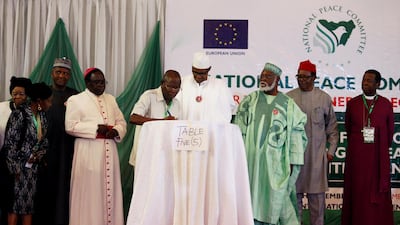As concerns of violence grow ahead of elections in February, Nigeria’s main opposition candidate was absent on Tuesday as presidential candidates pledged to hold a peaceful vote.
Nigeria’s stricken president, Muhammadu Buhari, was in attendance alongside 69 other hopefuls.
On Wednesday, Atiku Abubakar’s Peoples Democratic Party (PDP) blamed his non-attendance on a “communication lapse” between the National Peace Committee, which organises the event, and its national secretariat. The PDP also affirmed its candidate’s commitment to avoiding violence during the campaign and election.
But the incident has resuscitated fears of electoral violence in Africa’s most populous nation, where vote-rigging, intimidation and violence were once the norm.
The National Peace Committee emerged after political violence in the 2011 elections, the bloodiest in Nigeria’s history, when some 800 people were killed and 65,000 displaced. Mr Buhari stood and lost in that election.
But the threat of conflict remains. “Commitments on paper alone will not prevent electoral fraud of violence if either Mr Buhari or Mr Abubakar – or their supporters – come to believe that is their best option for claiming power,” Ed Hobey-Hamsher, senior Africa analyst at Verisk Maplecroft, told The National.
______________
Read more:
CDC, the UK's finance unit, looks to invest $1.2bn in Nigeria post-Brexit
Nigerian oil company to be investigated over alleged $3.5bn subsidies purchase
Cholera outbreak in Nigeria claims nearly 100 lives
______________
An informal agreement sees the Nigerian presidency alternate between a northern Muslim and a southern Christian after two terms – a recipe for intercommunal violence. The risk of violence in this election is lower that it could be, however, because Mr Buhari and Mr Abubakar are both northern Muslims competing for their chance at the rotating seat and the divide is largely political rather than ethnic, Mark Amaza, an independent political analyst in Nigeria, told The National.
Nevertheless, the build-up to February 2019 has been febrile, with Mr Buhari’s record blighted by incapacitating illness, economic stagnation and a brutal Boko Haram insurgency that has killed 20,000 people and displaced millions since 2009. Morale is extremely low in Nigeria’s battered military, which has made scant progress against the insurgents.
Last week, Mr Abubakar’s running mate, Peter Obi, claimed authorities had frozen his bank accounts. Just days before, Mr Buhari, who has spent large portions of his presidency in London for medical treatment, assured voters he had not died and been replaced by an imposter.
The fight against Boko Haram has seen the military deployed in 33 of the country’s 36 states. In October, Nigerian security forces killed 45 Shia Muslim protesters in the capital, Abuja, according to Amnesty International. In the same month, a spat between Muslim and Christian youths at a market in northern Kaduna state, reportedly over a wheelbarrow, left 55 dead.
Driven by climate change, violence between nomadic Fulani Muslim herders and farmers – many of whom are Christian – in central and eastern Nigeria, has killed thousands.
Quite apart from communal tensions, 87 million Nigerians live in extreme poverty. The Nigerian economy, plagued by corruption, recently emerged from a six-quarter recession.
With perceptions of fairness crucial to avoiding unrest, biometric voter cards, introduced in 2015, will again be used to reduce the risk of fraud. But violence cannot be ruled out.
“Delays to the election, violence during campaigning or voting, the ability or otherwise of the electoral commission to deliver a credible vote and transparent results, and inconclusive or narrow results will all move the dial on the risk of electoral violence,” said Mr Hobey-Hamsher.

